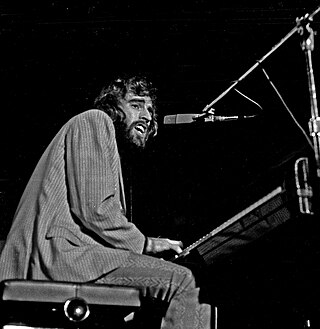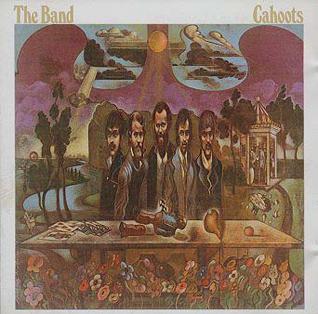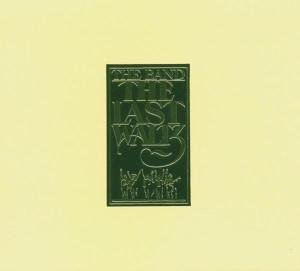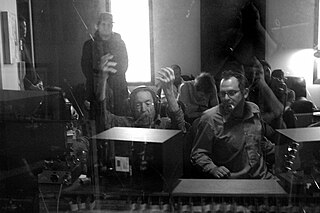Related Research Articles

The Band was a Canadian-American rock band formed in Toronto, Ontario, in 1967. It consisted of Canadians Rick Danko, Garth Hudson, Richard Manuel, Robbie Robertson, and American Levon Helm. The Band combined elements of Americana, folk, rock, jazz, country, influencing musicians such as George Harrison, Elton John, the Grateful Dead, Eric Clapton and Wilco.

Paul Frederic Simon is an American singer-songwriter known both for his solo work and his collaboration with Art Garfunkel. He and his school friend Garfunkel, whom he met in 1953, came to prominence in the 1960s as Simon & Garfunkel. Their blend of folk and rock, including hits such as "The Sound of Silence", "Mrs. Robinson", "America" and "The Boxer", served as a soundtrack to the counterculture movement. Their final album, Bridge Over Troubled Water (1970), is among the bestselling of all time.

Music from Big Pink is the debut studio album by the Band. Released in 1968, it employs a distinctive blend of country, rock, folk, classical, R&B, blues, and soul. The music was composed partly in "Big Pink", a house shared by bassist/singer Rick Danko, pianist/singer Richard Manuel and organist Garth Hudson in West Saugerties, New York. The album itself was recorded in studios in New York and Los Angeles in 1968, and followed the band's backing of Bob Dylan on his 1966 tour and time spent together in upstate New York recording material that was officially released in 1975 as The Basement Tapes, also with Dylan. The cover artwork is a painting by Dylan.

Richard Clare Danko was a Canadian musician, bassist, songwriter, and singer, best known as a founding member of the Band, for which he was inducted into the Rock and Roll Hall of Fame in 1994.

Richard George Manuel was a Canadian musician, singer, and songwriter, best known as a pianist and one of three lead singers in the Band, for which he was posthumously inducted into the Rock and Roll Hall of Fame in 1994.

Eric "Garth" Hudson is a Canadian multi-instrumentalist best known as the keyboardist and occasional saxophonist for rock group the Band, for which he was inducted into the Rock and Roll Hall of Fame in 1994. He was a principal architect of the group's sound, described as "the most brilliant organist in the rock world" by Keyboard magazine. With the deaths of Richard Manuel in 1986, Rick Danko in 1999, Levon Helm in 2012, and Robbie Robertson in 2023, Hudson is the last living original member of the Band.

Stage Fright is the third studio album by Canadian–American group the Band, released in 1970. It featured two of the group's best known songs, "The Shape I'm In" and "Stage Fright", both of which showcased inspired lead vocal performances and became staples in the group's live shows.

Cahoots is the fourth studio album by Canadian/American rock group the Band. It was released in 1971 to mixed reviews, and was their last album of original material for four years. The album's front cover was painted by New York artist/illustrator Gilbert Stone, while the back cover features a photograph portrait of the group by Richard Avedon. The album features guest vocals from Van Morrison. Libby Titus, the partner of drummer Levon Helm and mother of their daughter Amy Helm, also contributed uncredited backing vocals to "The River Hymn", the first time a woman appeared on a Band album.

Northern Lights – Southern Cross is the sixth studio album by Canadian-American rock group the Band, released in 1975. It was the first album to be recorded at their new California studio, Shangri-La, and the first album of all new material since 1971's Cahoots. It was recorded using a 24-track tape recorder, which allowed Garth Hudson to include multiple layers of keyboards on several tracks, and it is the only Band album where all songs are credited as compositions of guitarist Robbie Robertson.

The Last Waltz is the second live album by the Band, released on Warner Bros. Records in 1978, catalogue 3WS 3146. It is the soundtrack to the 1978 film of the same name, and the final album by the original configuration of the Band. It peaked at No. 16 on the Billboard 200.

Jericho is the eighth studio album by Canadian-American rock group the Band. Coming seventeen years after their "farewell concert", it was released in 1993 and was the first album to feature the latter-day configuration of the group, as well as their first release for the Rhino subsidiary Pyramid Records.

Donald William "Bob" Johnston was an American record producer, best known for his work with Bob Dylan, Johnny Cash, Leonard Cohen, and Simon & Garfunkel.
"Chest Fever" is a song recorded by the Band on its 1968 debut, Music from Big Pink. It is, according to Peter Viney, a historian of the group, the album track that has appeared on the most subsequent live albums and compilations, second only to "The Weight".

The Concert in Central Park is the first live album by American folk rock duo Simon & Garfunkel, released on February 16, 1982, by Warner Bros. Records. It was recorded on September 19, 1981, at a free benefit concert on the Great Lawn in Central Park, New York City, where the pair performed in front of 500,000 people. A film of the event was shown on TV and released on video. Proceeds went toward the redevelopment and maintenance of the park, which had deteriorated due to lack of municipal funding. The concert and album marked the start of a three-year reunion of Paul Simon and Art Garfunkel.
"We Can Talk" is a 1968 song by The Band that was the opener for the second side of their debut album Music From Big Pink Written by Richard Manuel, it features The Band's three main vocalists in nearly equal turns, often finishing each other's phrases. Initially a staple of their concerts, it was dropped from the set list in 1971.

"Whispering Pines" is a song written by Richard Manuel and Robbie Robertson that was first released by The Band on their self-titled 1969 album The Band. It was released as a single in France, backed by "Lonesome Suzie".
"Across the Great Divide" is a song written by Robbie Robertson. It was first released by The Band on their 1969 album The Band and was subsequently released on several live and compilation albums. According to music critic Barney Hoskyns, it was one of several songs that contributed to The Band being something of a concept album about the American South.
"The W.S. Walcott Medicine Show" is a song written by Robbie Robertson that was first released on the Band's 1970 album Stage Fright. It was also frequently performed in the group's live sets and appeared on several of their live albums. Based on Levon Helm's memories of minstrel and medicine shows in Arkansas, the song has been interpreted as an allegory on the music business. Garth Hudson received particular praise for his tenor saxophone playing on the song.
"The Unfaithful Servant" or "Unfaithful Servant" is a song written by Robbie Robertson that was first released by The Band on their 1969 album The Band. It was also released as the B-side of the group's "Rag Mama Rag" single. It has also appeared on several of the Band's live and compilation albums.
"Davy's on the Road Again" is a 1971 song by John Simon and written by Simon and Robbie Robertson. First released on John Simon's Album, the song charted at No. 6 on the UK Singles Chart when covered by Manfred Mann's Earth Band.
References
- 1 2 Colin Larkin, ed. (1992). The Guinness Encyclopedia of Popular Music (First ed.). Guinness Publishing. p. 2270/1. ISBN 0-85112-939-0.
- ↑ The Band: Music From Big Pink, by Barney Hoskyns
- ↑ The Band: The Band, by Barney Hoskyns
- 1 2 3 4 5 6 7 8 9 10 11 John Simon: Biography, by Bruce Eder
- 1 2 3 4 "John Simon". Johnsimonmusic.net. Retrieved 11 October 2021.
- 1 2 3 "John Simon". Theband.hiof.no. Retrieved 2014-07-12.
- ↑ Christgau, Robert (1981). "Consumer Guide '70s: S". Christgau's Record Guide: Rock Albums of the Seventies . Ticknor & Fields. ISBN 089919026X . Retrieved March 12, 2019– via robertchristgau.com.
- 1 2 3 4 5 "Lee Gabites: An Appreciation of John Simon's Solo Career". Theband.hiof.no. 1941-08-11. Retrieved 2014-07-12.